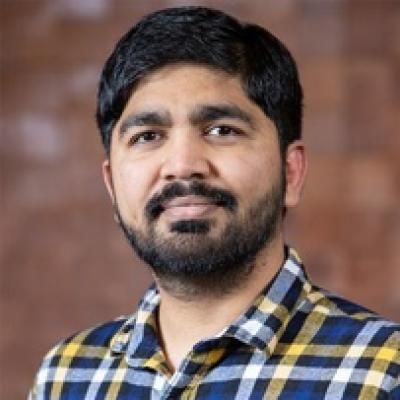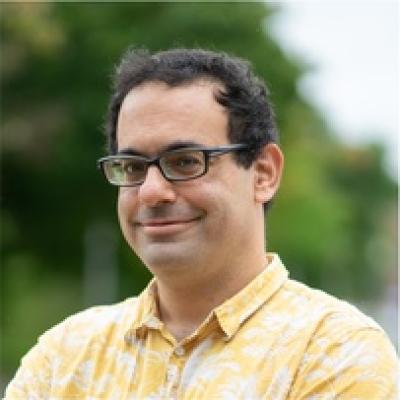Karkar, Zick Receive NSF CAREER Awards
Content

Manning College of Information and Computer Sciences Assistant Professors Ravi Karkar and Yair Zick have each received National Science Foundation (NSF) CAREER awards in the 2024–2025 academic year, for their work to enhance the design and theory of self-experimentation and advance large‑scale resource allocation, respectively.
The CAREER Program offers the NSF’s most prestigious awards in support of early-career faculty, aiming to boost those who can serve as academic role models in research and education and lead advances in their department or organization’s mission.
Despite the rapidly growing $54 billion market for health trackers promising personalized health insights, many users struggle to transform their collected data into meaningful health decisions. Karkar's proposed research aims to address this gap by transforming self-experimentation—where individuals use personal data to answer health-related questions such as identifying triggers for chronic conditions or optimizing lifestyle factors—from a complex practice requiring advanced expertise to an accessible, practical approach for the general population.
"Currently, self-experimentation is largely limited to individuals who possess specialized knowledge and substantial resources. Even answering seemingly straightforward questions is not well-supported by mainstream health tracking technologies — Is coffee or milk the trigger for my irritable bowel syndrome symptoms? Does taking aspirin affect my menstrual flow? Will exercising in the evening improve my sleep quality?" explains Karkar. "My goal is to democratize this practice, enabling everyday users to conduct meaningful experiments, analyze their results effectively, and make informed decisions about their health.”
Through a systematic combination of theoretical exploration and practical applications, Karkar’s project will first assess the existing barriers and needs in self-experimentation across various health domains. He will then develop and validate innovative design patterns to simplify experiment selection, improve data robustness, and personalize communication of results through tailored visualizations and actionable recommendations.
"We plan to introduce a structured life-cycle model of self-experimentation that clearly defines each stage of the process," says Karkar. "This research isn't just theoretical—our evidence-based design innovations aim to significantly improve how people engage with their health data and ultimately lead to better health outcomes, especially for those managing chronic conditions."
Beyond individual benefits, Karkar’s research is hopeful for broader societal impacts, including improved management of chronic conditions and enhanced public engagement with health research, particularly in rural and underserved communities.
In the classroom, Karkar will integrate these advancements into his teaching, especially through his personal health informatics course. "I am particularly excited to involve undergraduate students in this research. Their perspectives are crucial to designing health technologies that work for diverse users in real-world situations," Karkar adds.
Resource allocation, the process of distributing resources among users, tasks, or applications, is critical in many real-world scenarios, such as scheduling worker shifts, disaster relief distribution, and assigning courses to students. Zick’s research addresses key challenges such as effective preference elicitation – methods to effectively gather people’s preferences while minimizing cognitive burden; for instance, managing when an employee might be able to take either shift A or B but not both –, managing preference uncertainty, and developing computational methods capable of handling large-scale allocation problems.
"We engage in preference elicitation problems all the time, whether it’s trying to figure out what movie to watch or choosing what’s for dinner. Doing this at scale is the real challenge,” says Zick. “My goal is to help design systems that help distribute limited resources for thousands of users, like allocating courses or deciding which parts of a road network to repair.”
Leveraging interdisciplinary techniques from machine learning, game theory, and optimization, Zick’s project aims to develop intuitive algorithms and software tools designed to ensure allocations are both balanced and robust and to contribute to educational advancements in collective decision-making.
“We live in a world where we delegate significant portions of our decision-making to automated systems. This is sometimes necessary – there is no way that one person can take in the preferences of thousands of people and come up with the best possible outcome,” he says. “I hope that my work will allow us to harness powerful algorithmic frameworks while ensuring that the outcomes they select are beneficial.”
Karkar joined the CICS faculty in 2022 after earning his doctorate in computer science and engineering from the University of Washington. His research primarily focuses on designing tools that facilitate data-driven personal health management, collaborative medical care, and effective self-monitoring of chronic health conditions. He is also a co-author of “Deploying and Examining Beacon for At-Home Patient Self-Monitoring with Critical Flicker Frequency,” which received a SIGCHI 2025 Best Paper Award.
Zick joined the CICS faculty in 2020. His research intersects computational game theory, economic aspects of resource distribution, and trustworthy machine learning. He received a PhD in mathematics from Nanyang Technological University, Singapore, in 2014.

